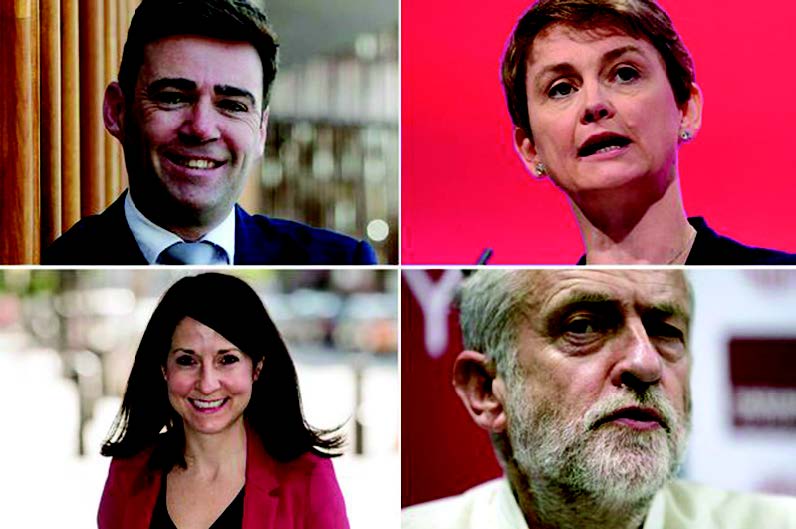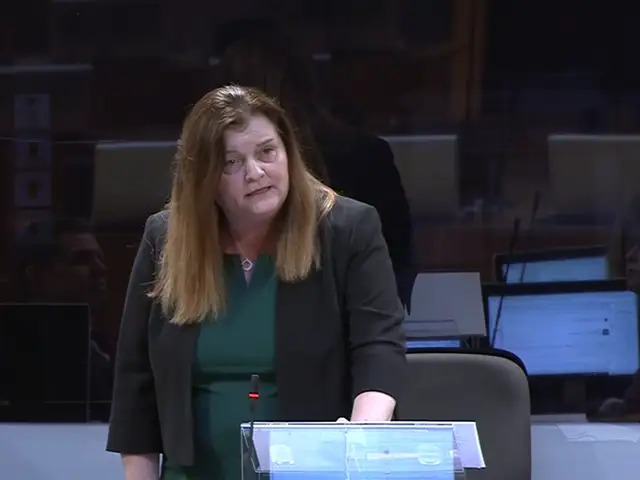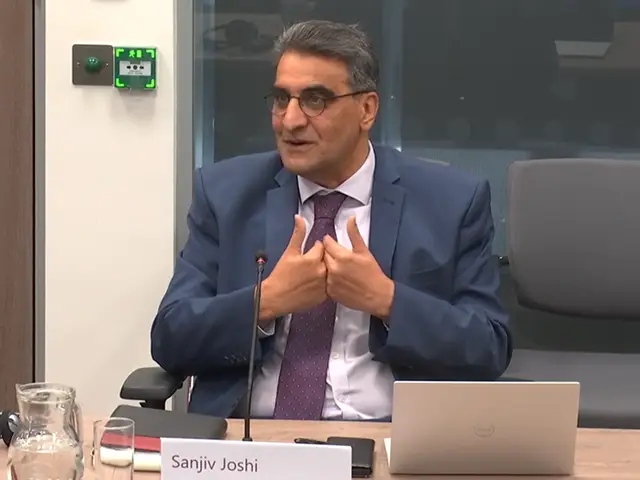Politics
Candidates complain about ‘unfair’ leadership race

 THE ONGOING entertainment saga that is the Labour leadership contest took a new turn last week, when three of the candidates complained to the party that the election was unfair.
THE ONGOING entertainment saga that is the Labour leadership contest took a new turn last week, when three of the candidates complained to the party that the election was unfair.
Liz Kendall, Yvette Cooper and Andy Burnham’s campaign managers were co-signatories on an email sent to the party, complaining that they would not receive a list of who was eligible to vote until ten days into the election.
Their claim was that Jeremy Corbyn, who has the support of major Unions, will know which union members have voted before this, and will be able to target them accordingly.
These claims have been denounced by members of ‘Team Corbyn,’ who say that everyone will receive the data at the same time.
This was the latest in a series of attacks from the two ‘centrish’ candidates, and Liz Kendall. In the early days of the campaign, there was an almost gentlemanly feel to proceedings. The candidates publicly disagreed, mostly with Mr Corbyn, while failing to say or do anything to differentiate themselves from the Labour party which lost the last General Election by a margin that even took YouGov by surprise, other than to subtly blame Ed Milliband’s bacon sandwich malfunction.
Mr Burnham said at an early stage that the unexpected show of support for Mr Corbyn was a sign that the Labour party had misread the mood of its members and would-be supporters. He was also the only candidate who, when asked whether he would serve in a Corbyn-led cabinet, said that he would, if it was the will of the party.
However, of late, he has started to question the frontrunner’s policies, claiming that the figures don’t add up. This has not stopped Yvette Cooper issuing a statement to the effect that he should leave the leadership race for not providing an ‘effective alternative’ to Mr Corbyn – a move described as ‘panicked, desperate, and straight out of the Ed Balls handbook,’ by one of Mr Burnham’s staff.
Yvette Cooper has also taken many a swipe at Mr Corbyn’s policies over the last week, describing them as ‘subversive.’ She also claimed that her policies were more radical than those of Mr Corbyn:
“So tell me what you think is more radical. Bringing back clause IV, spending billions of pounds we haven’t got switching control of some power stations from a group of white middle-aged men in an energy company to a group of white middle-aged men in Whitehall, as Jeremy wants? Or extending SureStart, giving mothers the power and confidence to transform their own lives and transform their children’s lives for years to come?” she asked at a speech in Manchester last week.
Liz Kendall, meanwhile, has been in a class of her own. For some ‘unknown’ reason, in spite of consistently finishing fourth in polls, which initially may or may not have been a ploy, the unrepentant Blairite is gaining at least as many if not more column inches than Ms Cooper and Mr Burnham. Her sentiments appear consistent, and can be summed up thus – ‘something something if Corbyn wins, warns Liz Kendall.’ Ms Kendall has also described the prospect of a Corbyn victory as ‘a resignation letter for Labour.’ She has advised her supporters to omit Mr Corbyn’s name from their other choices on the ballot, and cast a block vote for a second choice candidate in an attempt to stop Mr Corbyn should he fail to get 50 percent of the vote on the first count. Such democratic transparency is exactly what the Labour party needs to avoid alienating the new members and associates who have joined since the last General Election.
The most common issue raised by ex-Labour grandees is that Labour should be a party of government, not a party of opposition. This is, on the face of it, confusing when one considers that a party of opposition is exactly what it is going to be for the next five years. Ed Milliband was accused of taking the party too far to the left and, in the words of Chuka Umunna, not being business friendly enough.
This raises two points. Firstly, whether or not anyone actually read the manifesto for the 2015 election bid. The only reasons that Mr Milliband, and especially his Osborne-lite shadow Chancellor Ed Balls could be described as left-wing were:
- In comparison to David Cameron and George Osborne
- As a result of Unions backing him in the last leadership campaign
- Because red rhymes with Ed
The ‘pro-business’ idea is also, on the face of it, rather concerning. It evidently means more than the obvious definition, ie, in favour of businesses. It appears that the return to the Mandelson era of people being encouraged to get ‘filthy rich’ as long as they pay tax is being encouraged.
However, what many commentators seem to be wilfully failing to acknowledge is that the political landscape has changed. Basing policies on the infamous picking up of votes in Nuneaton worked very well when Labour could still hold all their heartlands unchallenged. No one appears to have asked why Labour got wiped out in Scotland, and whether or not those seats were lost due to not being pro-business enough, or possibly as a result of a popular Nationalist movement with a definite Socialist flavour.
As we have pointed out before, voter apathy and UKIP could well be far more important to the future of the Labour party than aforementioned businesses and Nuneaton. Mr Corbyn has been acknowledged as injecting some life into the Labour leadership contest, largely because based on the performance of the other main candidates the party faithful would be torn between an Everton-supporting ‘man of the people’, a ‘feminist’ and a Blairite who missed the glory years. These would have campaigned on a platform of how much better they were than their two opponents. It is hard to imagine a less edifying spectacle. Thankfully, they have been able to unite in the face of a common foe – the Labour left who persist in ‘voting with their hearts.’
Whether or not Mr Corbyn becomes the next leader, this contest has exposed a deep divide between what a number of Labour voters want, and what they are being told by the party leaders that they need. This is something that will have to be addressed. It is commonly accepted that Mr Corbyn will be doomed by a Murdoch-led right-wing media; this ignores the fate of arch-Blairite Gordon Brown. It is safe to assume that whoever gets the nod will fail to get mainstream media backing, unless Mr Murdoch needs a new godfather and David Cameron’s mobile phone is turned off.
If whoever leads Labour can somehow connect with the 45 percent of the population who either voted for no one or UKIP, the gap between everyone digging out their D-Ream CDs in 2020 or Boris Johnson PM could be much closer than is currently suggested.
Politics
Historic trees on Caldey Island set to be felled

THE FELLING of more than 50 trees on Pembrokeshire’s Caldey Island following “recent extreme weather events” has recently been given an on-paper thumbs-up by the national park.
In an application to Pembrokeshire Coast National Park, made through agent HW Forestry Ltd, Tim Hartley of Caldey Island sought backing for the felling of approximately 55 trees, with crown reduction or pollarding of approximately 11 trees and deadwood removal from four linear groups of trees.
The application partly affects the Grade-II-registered historic park and garden at Caldey Priory.
Trees for removal – the majority of which are Monterey pines – include many Ash which “continue to decline across the Island,” as well as storm-damaged trees.
An officer report says: “The key tree removals noted in the [supporting] report relate to works for health and safety matters arising from recent extreme weather events, that has resulted in the loss of significant sections of the individual crowns, as well as some of the trees having been structurally compromised through root plate movement or structural damage to stems and unions.
“There are also some trees that have outgrown their context in terms of location and also their form with asymmetrical unbalanced crowns. This combined with scattered trees having been damaged within the groups has resulted in the need for intervention.
“Unfortunately, some of the trees and groups are of a form with high, lateral crowns that cannot be pruned in a way that would retain amenity. There are also works required for the pruning of trees on the island to remove dead branches and failed branches which does not require a conservation area notification.”
It concludes: “Overall, the works will have an impact on the setting of the conservation area, and there will be an impact on the amenity of the conservation area to some extent; however [a site visit and report] considers the works to appropriate in relation to health and safety, and the imposition of a TPO would not be a reasonable approach at this time.”
The national park ‘approval’ took the form of no objection being raised.
Politics
Senedd holds urgent debate on ‘callous’ welfare cuts

SENEDD members criticised Westminster’s “short-sighted, immoral and unethical” plans to slash spending on welfare by £4.8bn a year by the end of the decade.
Sioned Williams said she was extremely disappointed it took a motion to call an urgent debate to “force” Labour ministers to discuss the issue in the Senedd.
Plaid Cymru’s shadow social justice secretary raised the Bevan Foundation’s warning that the cuts will have a “huge and concerning” impact on 275,000 people in Wales.
Ms Williams described the reforms as the biggest cuts to disability benefits on record, with hundreds of thousands of people at risk of being pushed into poverty.
Calling for unambiguous condemnation from ministers in Cardiff Bay, she said: “The impact of these unprecedented cuts to disability benefits on Wales will be devastating.”
Leading the urgent debate on April 2, Ms Williams criticised first minister Eluned Morgan for “reserving her position” on the welfare reforms.
Altaf Hussain, the Conservatives’ shadow social justice secretary, stressed that welfare is not devolved to Wales, suggesting the debate will have little-to-no impact.
“This is not a UK Government known for listening to the Labour cliques in the Welsh Government,” he said. “Why should they pay any attention to what we say here today?”
Dr Hussain added: “Doing nothing is not an option, the bill for health and related benefits for people of working age is set to rise to £71bn a year by the end of the decade – far more than we spend on defending our nation.
Labour’s Hefin David, whose autistic daughter is in receipt of disability living allowance, told the Senedd: “I want her to be able to work. At the moment, I don’t know if she can … but she’s very creative and I would hope that the system will find, one day, a job for her.
“That is the role, I think, of the benefit system. At the moment … it is trapping people with autism, learning disabilities and other disabilities out of work and in poverty.”
The Caerphilly Senedd member voiced concerns about people with mental health conditions being stigmatised by some of the language in the UK Government’s green paper.
Dr David said he was willing to take Liz Kendall, the UK work and pensions secretary, at her word that the green paper is the beginning of the conversation – not the end.
Criticising “political pointscoring”, his Labour colleague Alun Davies pointed out that the Welsh Government backed the motion to hold the urgent debate.
He said: “I would have preferred the UK Government to make a clear statement that its purpose is the eradication of poverty, that it actively seeks a reduction in inequality.”
He added: “My fear at the moment is that this current UK Government is in danger of repeating the same mistakes as the Liberal Democrats in 2010 by accepting a conservative economic analysis then becoming the over-enthusiastic supporters of Tory austerity.”
Plaid Cymru leader Rhun ap Iorwerth argued Labour ministers have proved themselves “terribly ineffective” at influencing their UK colleagues.
He told the Senedd: “That’s reflected in the fact that no assessment has been made of the impact of the welfare cuts on Wales – it’s astonishing.”
Mr ap Iorwerth said: “We have been taken back to a time reminiscent of Conservative rule at Westminster, unleashing austerity … failing to consult with [the] Welsh Government and showing a carefree attitude to the impact of decisions on the people of Wales.”
Welsh Liberal Democrat Jane Dodds warned that disabled people face increased costs in their day-to-day lives as she criticised Labour for choosing not to tax the wealthiest.
Ms Dodds, the sole Lib Dem in the Senedd, said cutting benefits creates a false economy, raising concerns more people will be pushed into poverty and homelessness.
Plaid Cymru’s Adam Price accused Labour of choosing austerity over investment, warning: “The economic folly of these cuts is matched only by their moral bankruptcy.”
The former MP said the UK Government has unveiled a plan “so callous in its conception that it stands as nothing less than a betrayal of everything Labour once represented”.
Jane Hutt said the Welsh Government would carefully consider the impact of the proposed welfare cuts before responding to the UK Government’s consultation.
The social justice secretary pledged to ensure the voices of disabled people are heard in the Welsh Government’s response to the consultation which closes on June 13.
Health
‘Nobody taking responsibility’ for paying care workers the real living wage

CARE HOME providers urged the Welsh Government to follow through on a key commitment to ensure care workers are paid the real living wage.
Giving evidence in the Senedd, Care Forum Wales, which represents more than 450 care homes, warned funding did not reach all parts of the sector in 2024/25.
The non-profit organisation said funding for the real living wage (RLW) was not ringfenced, so some councils chose to spend the money on libraries and teachers’ salaries instead.
Care Forum Wales raised concerns about “nobody taking responsibility”, with the Welsh Government claiming to have provided the money and councils saying it was insufficient.
Labour’s manifesto for the 2021 election contained a pledge to “ensure care workers are paid the real living wage during the next Senedd term”.
But Sanjiv Joshi, Care Forum Wales’ treasurer, warned the Welsh Government’s push for care workers to receive the real living wage has become an aspiration rather than a reality.
He told the local government committee: “The first year when it was announced … providers had to give an undertaking to commissioners that we were paying the real living wage.
“Since then, that’s now become aspirational as commissioners have not had the funds – or so we are told – to follow through and maintain those real living wages.”
Giving evidence on April 3, Melanie Minty, policy adviser at Care Forum Wales, said: “The real living wage, as Sanjiv said, isn’t reaching the sector necessarily.”
But, describing the RLW as a drop in the ocean, she warned care homes cannot compete with councils and the NHS which pay a higher rate than used in costing commissioned care.
Under the Welsh Government’s 2025/26 budget, funding for the real living wage is allocated to councils within the revenue support grant, meaning it can be spent on other areas.
Ms Minty also voiced concerns about an increasing number of councils receiving grants to build care homes that “will never recover their costs”.
She pointed to the example of Carmarthenshire Council building a £19.5m residential home despite free capacity in the county’s independent sector.
Cautioning that commissioning too often focuses on cost over outcomes, she said: “I’ve heard of commissioners going into homes and saying ‘you’re spending too much on food’.
“Things like holidays have been drastically cut back for younger people.”
Mr Joshi, who runs the Caron group of care homes in mid and south Wales – which includes Valley View Care Home in Hengoed – warned of a £9,000-a-year difference in nursing fees between neighbouring councils.
He said: “We’re talking about Cardiff and RCT … imagine the pressure that puts on and it’s not driven by the needs, the needs would not be that different.”
Pressed about the minimum level of profits required to make services feasible, Mr Joshi replied that he targets an 11% return which is unachievable in parts of Wales.
Warning of an “irrational” policy direction, he said: “We have the private sector delivering incredible value for money [yet] being eroded by underfunding. Then we have the public sector spending four or five times that amount, it doesn’t make sense.”
Mr Joshi told the committee families are increasingly having to make up a difference in costs that should be provided by councils and health boards.
Warning charity providers are exiting the market, Ms Minty said: “Most of our third-sector members have sold their care homes because they are not viable.”
Ms Minty called for a fee methodology that can be applied consistently across Wales, with some councils far more transparent and understanding of the costs than others.
“Cardiff, while giving a really good increase this year, has been very honest in admitting they know it’s not going to meet all the changes,” she said. “Whereas other local authorities … have been known to make an offer and say this will cover all sorts of things.”
She said the sector has stabilised since the pandemic and Brexit but increasing employer national insurance contributions have added to the pressure.
She told the committee: “I think we’ll see an unintended consequence will be that employers are forced to suppress pay increases … and some will be forced to make redundancies.”
-

 Business6 days ago
Business6 days agoSpaceX eyes Milford Haven for new UK facility
-

 Crime7 days ago
Crime7 days agoPembrokeshire farm worker accused of threatening to burn employer’s farm
-

 Crime6 days ago
Crime6 days ago‘Yeah but no but’ insult to female officer lands Monkton man with court fine
-

 Features6 days ago
Features6 days ago‘We weren’t wild. We were unprotected’: A generation groomed and forgotten
-

 Crime6 days ago
Crime6 days agoLeaked messages reveal shocking culture at HMP Parc amid misconduct probe
-

 Community7 days ago
Community7 days agoTenby boat lift signals start of tourist season in Pembrokeshire
-

 Crime6 days ago
Crime6 days agoInquest reveals tragic consequences of inadequate medication in prison
-

 Crime6 days ago
Crime6 days agoPub worker gets suspended sentence for failing to do unpaid work































